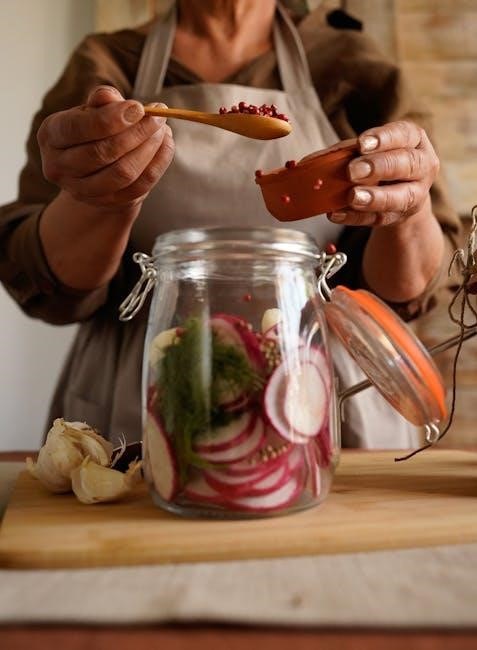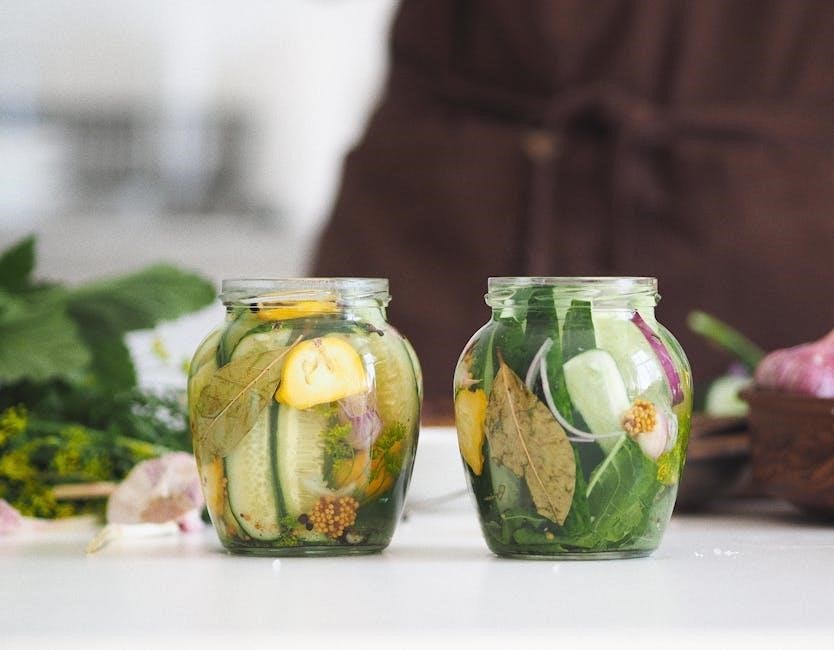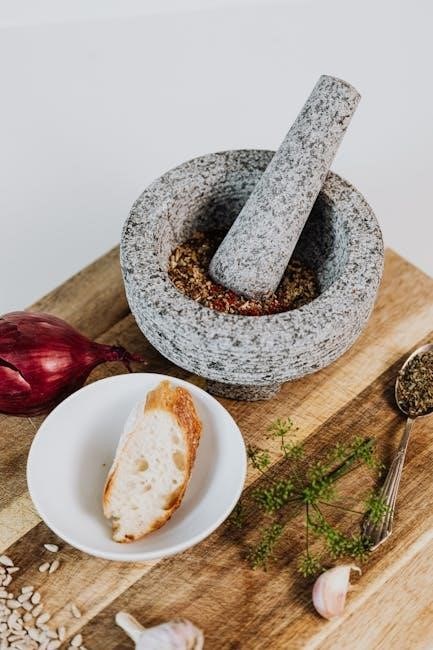
Kosher dill pickles are a classic favorite, combining tangy, salty, and garlicky flavors. Made with fresh cucumbers, dill, and spices, they’re a perfect snack or addition to meals. Using a pre-mixed blend ensures an authentic flavor with minimal effort, making homemade pickling simple and delicious.
What Are Kosher Dill Pickles?
Kosher dill pickles are a traditional variety of pickled cucumbers flavored with dill, garlic, and spices. The term “kosher” reflects their roots in Jewish cuisine, though they are now enjoyed worldwide. These pickles are known for their tangy, salty taste, achieved through a brine made with water, vinegar, kosher salt, and a blend of spices like mustard seeds, coriander, and whole black peppercorns. Fresh or dried dill weed is added for the distinctive flavor. Optional ingredients like garlic cloves or chili peppers can enhance the taste. Kosher dill pickles can be made using traditional fermentation or quick recipes, and they’re often packed into jars for snacking or serving alongside meals. Store-bought mixes simplify the process for homemade enthusiasts.
History and Popularity of Kosher Dill Pickles
Kosher dill pickles have a rich history rooted in Jewish cuisine, originating in Eastern Europe. The name “kosher” reflects their adherence to traditional Jewish dietary practices, though they are enjoyed by people of all backgrounds. These pickles gained popularity in the U.S. as Jewish immigrants brought their recipes, often serving them in delis and restaurants. Their tangy, garlicky flavor resonated with American palates, making them a staple in many households. Over time, pre-made mixes simplified the pickling process, allowing home cooks to replicate authentic kosher dill flavors easily. Today, they remain a beloved snack and ingredient, celebrated for their versatility and bold taste.
Gathering Ingredients for Kosher Dill Pickles

Fresh pickling cucumbers, dill, garlic, water, white vinegar, and kosher salt are essential. Optional additions include red pepper flakes, mustard seeds, and coriander for extra flavor.
Essential Ingredients
Fresh pickling cucumbers are the star, while water and white vinegar create the brine. Kosher salt enhances flavor and acts as a natural preservative. Garlic and fresh or dried dill are crucial for authentic taste. Optional additions like mustard seeds, coriander, or red pepper flakes add depth. A pre-made kosher dill pickle mix simplifies the process, combining spices in perfect proportions. Always use vinegar with 5% acidity for proper pickling. Freshness of ingredients ensures crisp, flavorful pickles. Adjust quantities based on batch size, but maintain the balance of tangy, salty, and herby notes that define kosher dill pickles.

Pickling Spices and Seasonings
The heart of kosher dill pickles lies in their spices. Dill seeds or fresh dill provide the iconic flavor, while garlic adds a savory punch. Mustard seeds, coriander, and black peppercorns contribute depth and warmth. Red pepper flakes can add a spicy kick for those who prefer it. Turmeric is sometimes used for color. These spices are often combined in a store-bought mix, but you can customize them to taste. The brine’s balance of tangy vinegar, salty kosher salt, and aromatic spices creates the perfect environment for pickling. Adjusting these seasonings allows you to tailor the pickles’ flavor profile, ensuring they’re crisp, zesty, and full of character.

Basic Instructions for Making Kosher Dill Pickles
Start by preparing cucumbers, washing and trimming ends. Combine pickle mix, water, and vinegar in a saucepan, heating until dissolved. Pack cucumbers and garlic into jars, pouring the brine over them. Seal jars and refrigerate or can for storage.
Preparing the Cucumbers
Begin by washing fresh pickling cucumbers thoroughly under cold water to remove dirt and bacteria. Trim both ends to ensure even pickling and crisp texture. For whole pickles, leave cucumbers intact, or slice them into spears or chips for variety. Soaking cucumbers in ice water for 30 minutes can enhance crunchiness. Pat dry with paper towels to remove excess moisture before packing into jars. Freshness is key, so use cucumbers within a day of harvesting or purchasing for the best results. Proper preparation ensures pickles are firm and flavorful, avoiding sogginess.
Creating the Brine
To make the brine, combine water, white vinegar, and the kosher dill pickle mix in a saucepan. Heat the mixture over medium heat, stirring until the salt and spices dissolve. For a classic brine, use a ratio of 2 cups water to 1 cup vinegar and 2 tablespoons of the mix. Bring the brine to a boil, then reduce heat and simmer for 5-10 minutes to meld flavors. Let it cool slightly before pouring over packed cucumbers. This step ensures pickles absorb the tangy, savory flavors evenly. Proper brine preparation is crucial for achieving that signature kosher dill taste and texture.
Packing the Jars
Begin by washing and sterilizing jars, lids, and utensils. Place 1-2 tablespoons of pickling spices, garlic, and fresh dill at the bottom of each jar. Pack pickling cucumbers tightly, leaving 1/2 inch of space. Pour the prepared brine over the cucumbers, ensuring they are fully covered. Remove air bubbles with a utensil and wipe rims clean. Secure lids and bands tightly. For refrigeration, let cool before chilling. For canning, process in a boiling water bath for 10 minutes. Store sealed jars in a cool, dark place. Proper packing ensures crisp, flavorful pickles with a long shelf life. Optional: Add garlic or chili flakes for extra flavor.

Advanced Tips for Perfect Kosher Dill Pickles
For enhanced flavor, add garlic, mustard seeds, or chili flakes to the brine. Experiment with spices like coriander or dill seeds for a personalized taste. Use fresh dill for the best aroma and crunch. Always pack cucumbers tightly to avoid sogginess. For extra crispness, add pickling salt or calcium chloride. Monitor fermentation time to achieve the perfect tang. Store jars in a cool, dark place for optimal flavor development. These tips ensure your pickles are crunchy, flavorful, and perfectly seasoned every time. Try new ingredients to create unique variations. Proper techniques guarantee delicious results. Enjoy your homemade pickles!
Using Pickle Mixes for Convenience

Using a kosher dill pickle mix is a time-saving way to achieve authentic flavor. These pre-blended mixes typically include dill, garlic, and spices, eliminating the need to measure individual ingredients. Simply combine the mix with water and vinegar, then pour the brine over prepared cucumbers. Follow package instructions for precise ratios to ensure proper acidity and safety. This method is ideal for beginners or those short on time, as it streamlines the pickling process while delivering consistent results. Many mixes, like Mrs. Wages or Ball Pickle Mix, are designed for both refrigerator and canning methods, offering flexibility. This convenient approach guarantees delicious, crunchy pickles with minimal effort. Customize by adding fresh dill or garlic for extra flavor. Perfect for quick, flavorful pickling; Always follow safety guidelines for canning.
Adding Optional Ingredients for Custom Flavor

Enhance your kosher dill pickles by incorporating optional ingredients for a personalized taste. Add garlic cloves for a robust flavor or red pepper flakes for a spicy kick. Fresh dill sprigs can intensify the dill taste, while a pinch of sugar balances acidity. Experiment with coriander or mustard seeds for depth, or onions for texture. Herbs like parsley or thyme offer unique twists. For adventurous eaters, try pickling additional vegetables like carrots alongside cucumbers. Always maintain proper canning practices to ensure safety and quality. These additions allow you to craft pickles that reflect your culinary preferences, making each batch truly one-of-a-kind.
Storage and Serving
Kosher dill pickles should be stored in the refrigerator to maintain crunchiness. They can be enjoyed as snacks or added to sandwiches and salads. Keep them refrigerated after opening.
Refrigeration vs. Canning
For kosher dill pickles, refrigeration is ideal for maintaining crunchiness and freshness. Store them in the fridge after opening, keeping them away from direct sunlight and heat. Canning, on the other hand, is perfect for long-term storage, allowing pickles to be shelf-stable without refrigeration. Canned pickles undergo a sterilization process to ensure safety and quality. Refrigeration offers a quicker, fresher taste, while canning is more convenient for pantry storage. Both methods preserve the pickles effectively, but refrigeration is recommended for shorter-term enjoyment and canning for longer storage needs. Proper sealing and sterilization are crucial for both techniques to prevent spoilage and ensure safety.
Best Practices for Long-Term Storage
Proper storage is essential for maintaining the quality of kosher dill pickles. For long-term storage, canned pickles should be kept in a cool, dark place with a consistent temperature. Jars must be sterilized and sealed tightly to prevent contamination. Refrigeration is ideal for pickles not canned, as it slows fermentation and preserves crunchiness. Always use clean utensils when handling stored pickles to avoid spoilage. If canning, ensure jars are properly sealed and store them in a dry, dark pantry. Regularly check for signs of spoilage, such as off odors or mold, and discard any compromised pickles. Proper storage ensures pickles remain fresh and flavorful for months.

Safety and Quality Control
Ensuring proper sterilization and contamination prevention is crucial for safety. Always check acidity levels and follow tested canning procedures to maintain quality and prevent spoilage effectively.

Ensuring Proper Sterilization
Sterilization is essential for safe canning of kosher dill pickles. Begin by thoroughly washing jars, lids, and utensils in hot soapy water. Rinse well and place them in a pot of boiling water for at least 10 minutes. Use a clean, non-reactive pot to prepare the brine, ensuring all equipment is free from contaminants. Proper sterilization prevents spoilage and ensures the pickles remain fresh. Always follow tested canning procedures to maintain safety and quality. This step is crucial for creating a clean environment for the pickling process, ensuring your homemade pickles are safe to enjoy year-round.
Signs of Spoilage and Storage Mistakes

Proper storage is crucial to prevent spoilage of kosher dill pickles. Look for signs such as off odors, mold, or slimy texture, which indicate spoilage. Jars with loose lids or bubbles in the brine may also be compromised. Store pickles in a cool, dark place, with sealed jars kept refrigerated after opening. Avoid using damaged or rusted jars, as they can harbor bacteria. Always follow sterilization and canning procedures to minimize risks. Improper storage can lead to contamination, making the pickles unsafe to eat. Regularly check stored jars for any signs of spoilage and discard any questionable pickles to ensure safety and quality.
Variations and Creative Uses
Kosher dill pickles can be enjoyed in various ways, from snacking to enhancing recipes. Use them in salads, sandwiches, or as a tangy topping for dishes like chips or bread.
Different Methods for Preparing Pickles
Preparing pickles can be done through various methods, each offering unique textures and flavors. The traditional method involves soaking cucumbers in a brine with dill and spices, allowing them to ferment naturally. This process enhances the pickles’ crunch and tanginess. Another popular approach is quick pickling, where cucumbers are submerged in a hot brine and refrigerated, resulting in a faster snack. Some recipes incorporate additional ingredients like garlic, mustard seeds, or chili peppers for extra flavor. Each method ensures a delicious outcome, whether you prefer classic dill, spicy variations, or sweeter options, making pickling versatile and enjoyable for all tastes.
Using Pickles in Recipes Beyond Snacking
Pickles are a versatile ingredient that can elevate various dishes beyond snacking. They add a tangy, salty flavor to sandwiches, wraps, and burgers. Finely chopped pickles can be mixed into dips, sauces, or dressings for added depth. In cooking, pickles enhance recipes like pasta salads, deviled eggs, and potato salads. They also serve as a unique topping for tacos or grilled meats. Additionally, pickle brine can be used as a marinade or in baking, such as in dill pickle bread. Incorporating pickles into your recipes introduces a burst of flavor and creativity, making them a valuable addition to any kitchen.